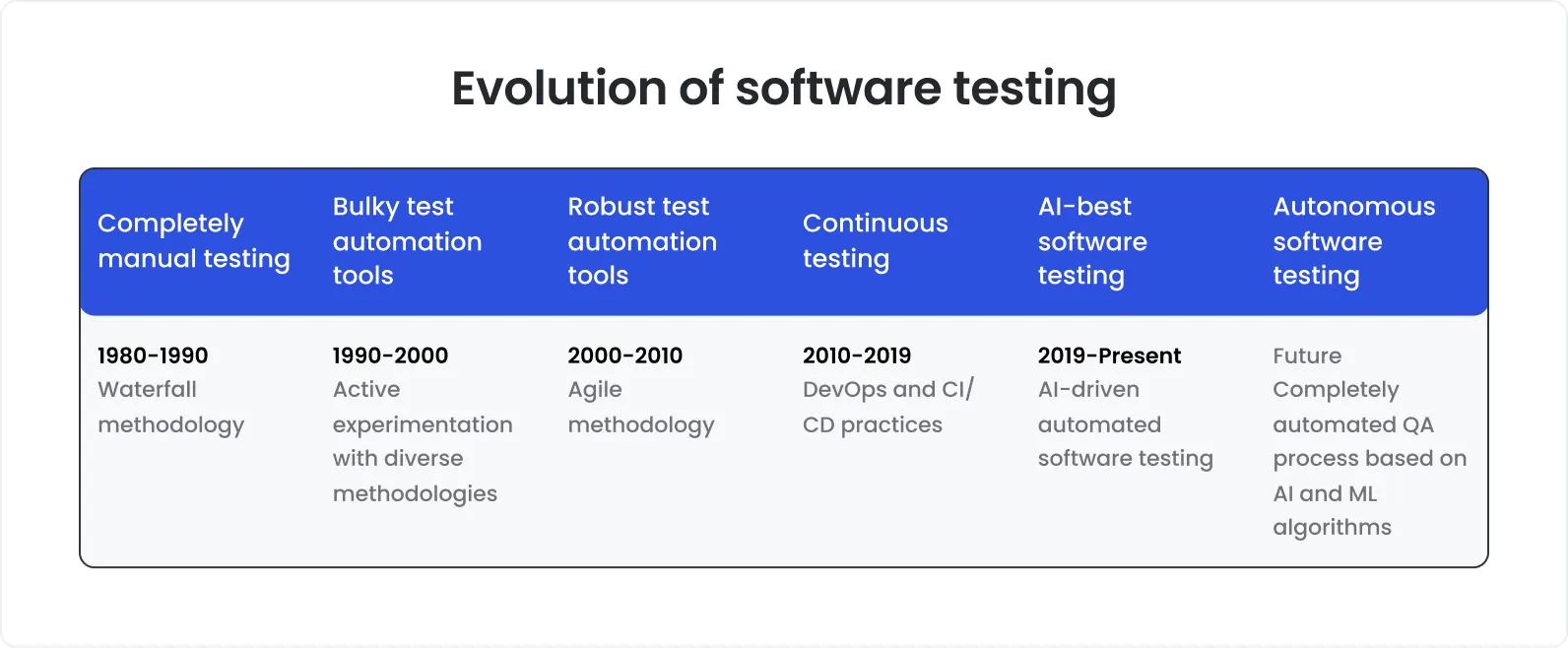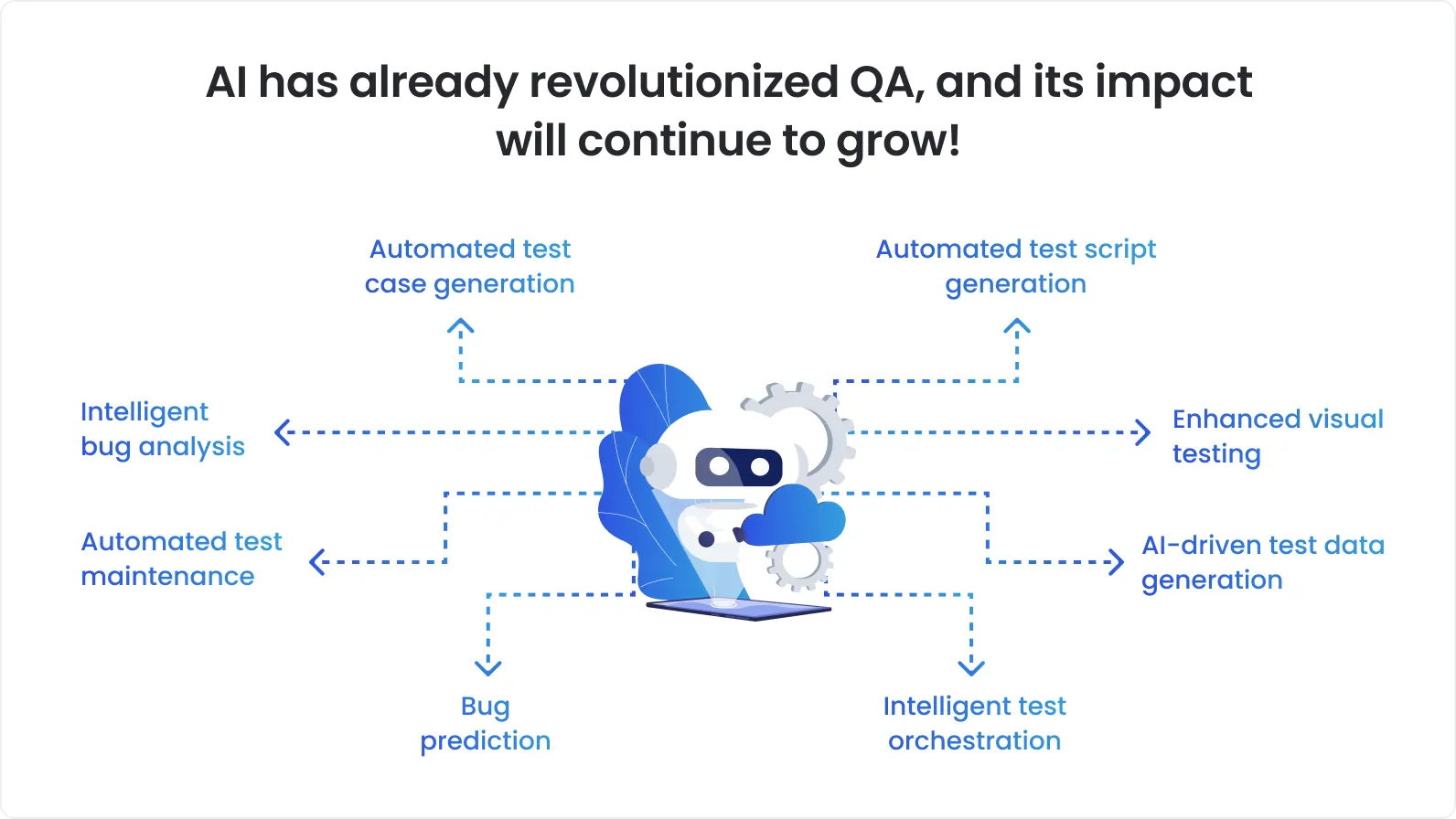16 minutes to read
What is AI-based software testing & QA


Chief Technology Officer
Today, we are witnessing a new pivot in the evolution of software testing as AI is increasingly integrated into QA. While some companies have already gained numerous benefits from AI-based software testing, others still hesitate to adopt it, despite its great impact on the industry, numerous benefits, and promising future.
Software testing evolution
Software testing aims to ensure the flawless operation of software systems so that end users can enjoy a seamless and outstanding experience. While at the very beginning, software testing implied solely manual test execution, over time, the first test automation solutions appeared.
Team up with an award-winning software QA and testing company
Trusted by 300+ clients worldwide
Quite bulky at first, they have been continuously improved as QA testers strived to make test automation more efficient and accurate. Still, even with the advent of continuous testing, software testing could not keep up with the demand for accelerated software delivery.
Keeping on pushing the envelope, QA experts have introduced AI to enhance test automation and decrease manual effort throughout the software testing process.

According to DigitalOcean research, 45% of respondents believe AI tools ease their work, while 43% feel they are overhyped.
Noteworthy, 31% don’t perceive them as a real threat to their job, though 8% do. 27% admit that AI tools enable them to focus on more critical tasks, while 19% note the need for taking additional safety measures before trusting them.
Another 19% notice no difference in their daily work due to these tools. Some 10% remain undecided, 8% state these tools introduce organizational confusion, 3% believe they complicate their job, and 2% are unfamiliar with AI tools.
AI adoption in software testing has revolutionized the industry. The use of diverse AI techniques facilitates the complete or partial automation of diverse QA activities.
Tasks that used to take a ton of time and effort can be completed now in the blink of an eye, streamlining the QA process and empowering businesses to deliver high-quality software products at high speed. No wonder that AI quality assurance is one of 10 software testing trends in 2025.
What is AI-based software testing?
The idea behind AI-based software testing is to integrate various AI techniques into the QA process. Due to this, AI-based testing enables the smart automation of diverse software testing aspects, in contrast to traditional software testing that requires extensive manual effort.
According to the TestRail research, about 65% of QA engineers have already used AI in this or that form in software testing. While ChatGPT is probably the most widely used AI tool, QA experts do not live by it alone.
Many QA engineers do use ChatGPT as a complementary tool, but there are also numerous specialized AI-powered testing solutions in their arsenal.
While traditional test automation tools mostly enable automated runs of predefined test scripts across various browsers and platforms, AI-powered ones go far beyond this and tackle many more QA tasks.

Here are some of the key areas where AI-based testing has advanced:
Automated test case generation
Without any human assistance, AI can analyze project requirements, user stories, and even application logs and, based on the studied data, automatically generate appropriate test cases. No need to say that this significantly speeds up a test design process, minimizes human mistakes, and ensures higher test coverage.
AI-driven test script generation
AI-assisted copilots and low-code automated testing solutions streamline the process of test script generation. Copilot tools use generative AI models to make context-aware suggestions, generate code snippets, and even write full scripts based on natural language input. AI-based low-code testing platforms, in turn, automatically generate scripts based on analyzed user actions or predefined templates, allowing testers with minimal coding skills to create robust test scripts. Both approaches boost overall testing efficiency.
Automated test maintenance
Manual test maintenance has been a real pain for automation QA engineers. Fortunately, modern AI-based tools come with a so-called self-healing feature that automatically adjusts test scripts whenever any changes to the application’s UI or code are made. This immensely reduces test maintenance time costs. Also, such tools keep your test suites relevant and efficient by deleting obsolete, low-value, or duplicated tests.
AI-driven test data generation
AI models can generate large volumes of test data that perfectly mimic production data, ensuring comprehensive testing without compromising confidential information. Such a quick generation of quality test data is crucial for testing financial and healthcare apps, where data privacy is of utter importance.
Bug prediction
By analyzing historical data from previous projects, for instance, defect logs, test execution reports, and code changes, AI tools can predict potential defects in the currently developed software. Therefore, QA teams know risky areas of the app in advance and direct their testing efforts to the most vulnerable parts.
Enhanced visual testing
Traditional visual testing requires manual examination of UI elements, but modern AI-powered visual testing tools automatically detect even the tiniest UI discrepancies that may affect the user experience. They compare screenshots and detect various visual issues, including misaligned buttons, font mismatches, or missing elements.
Intelligent bug analysis
AI can assist testers in quickly identifying the root causes of failures. By analyzing logs, test results, and historical data, AI can pinpoint the source of issues more accurately than manual analysis. This significantly speeds up the debugging process.
Intelligent test orchestration
AI has also optimized test orchestration by automating test scheduling and execution. AI-powered orchestration tools dynamically select relevant test cases for running based on the possible impact of recent code changes. This smart test selection shortens testing time and speeds up feedback in CI/CD environments, making it possible to deliver software faster without compromising quality.
AI-driven software testing is characterized by extensive automation, intelligent analysis, and self-optimizing processes, which ensure outstanding adaptability and flexibility of the entire QA process. Consequently, AI-based testing is a perfect fit for agile and DevOps environments with rapid iterations and continuous integration.
AI techniques and their practical applications in testing
As you might guess, AI technology is very complicated and is not limited to GenAI only. Modern automation testing solutions leverage a bunch of diverse AI techniques based on the tasks they aim to perform. Let’s take a look at the key AI techniques and their application in software testing.
Machine Learning (ML) focuses on the development of statistical algorithms that allow machines to learn from data to make decisions without explicit instructions.
Test case prioritization: ML algorithms analyze historical test data and prioritize test cases that are most likely to find bugs.
Bug prediction: ML algorithms identify code areas with a high likelihood of defects based on historical data, code complexity, and commit history.
Automated test generation: Using ML, test cases can be automatically generated based on patterns learned from existing tests and user behavior.
Natural Language Processing (NLP) focuses on understanding human languages—grammar, syntax, and semantics—to process text, audio, and video data and generate human language.
Test script generation: NLP techniques can analyze requirements and user stories written in natural language and then generate corresponding test cases automatically.
Bug report analysis: NLP models analyze bug reports and user feedback to identify trends, categorize issues, and assist in root cause analysis.
Requirements analysis: NLP techniques analyze requirements to help detect ambiguities, inconsistencies, or gaps.
Computer Vision technology extracts and analyzes useful information from visuals to enable systems to process visual data in a way that allows them to make decisions or take appropriate actions.
Visual testing: Computer vision models analyze screenshots and compare them against expected designs, detecting visual issues in user interfaces that may not be caught by traditional testing methods.
Deep Learning, as a subset of ML, leverages multilayered neural networks to make complex decisions and perform tasks related to classification, regression, and representation learning.
Different forms of deep learning power most AI applications today.
Code quality analysis: Deep learning models like GNNs are trained to analyze complex structural patterns of the code to detect any bugs.
Visual testing: Deep learning models are used for visual validation of software interfaces, as they are good at detecting visual bugs.
Anomaly detection: Deep learning models can study normal log data to understand the usual behavior of an application. Then, whenever new logs are generated, they alert about possible anomalies.
Bug prediction: Deep learning models carefully analyze historical test data, code changes, and commit data and rather accurately predict where bugs can appear.
Generative AI is a subset of AI that uses generative models to create text, images, videos, or other forms of data, usually in response to specific prompts.
Test data generation: GenAI models create realistic, synthetic test data that mimics production data.
Automated test case generation: GenAI models can also create appropriate test cases based on provided project requirements and user stories.
Automated test case generation: Test scripts in any of the modern programming languages, whether it is Java, JavaScript, Python, or anything else, can be automatically created by GenAI.
How does AI-based software testing impact business outcomes?
While AI is mainstream, many businesses face the question - what are real-life the advantages of AI in testing?
In essence, by automating and enhancing various aspects of the QA process with AI, companies streamline their software development lifecycles and consequently achieve better business outcomes. Let’s see in detail what businesses win:
Faster than ever time-to-market
Being first to market often means having a dominant position, so the hunger for speed is understandable. AI-based testing automates numerous QA tasks, empowering companies to test and deliver software faster. Products and updates can be released to the market more quickly, enabling businesses to capitalize on opportunities and react faster to new users’ demands.
Meeting the highest quality standards
AI-based testing leverages advanced techniques to ensure more comprehensive testing, identify defects early, and nip issues in the bud. All of these lead to fewer bugs in production, mitigating the risk of costly outages, ensuring a smoother user experience, increasing user satisfaction, and boosting retention rates that directly impact business revenue and growth.
Data-driven decision-making instead of guessing
AI tools analyze huge volumes of data—test results, user feedback, defect logs, etc.—and provide actionable insights that let QA teams align testing activities with business goals and make informed decisions about test priorities, risks, and release readiness.
Smarter labor resource allocation
By automating various QA tasks, AI-based testing allows businesses to achieve more with fewer resources, improving efficiency and maximizing the value brought by QA teams. The days when an army of testers was needed to ensure decent software quality and rapid releases are in the past.
Gaining unmatched competitive advantage
The implementation of AI-based testing gives businesses a competitive edge. Faster, high-quality releases can differentiate a company from its competitors, increase market share, reinforce a brand, and attract new users, while driving business growth.
Significant cost savings
By automating manual testing tasks, AI-based testing eliminates the need for extensive human effort. Additionally, bug prediction helps avoid costly fixes by catching defects early on. Lower testing costs and fewer post-release bugs result in significant savings.
Companies that embrace AI in testing not only release high-quality products faster, reduce costs, and improve user experience, but also take advantage of better business performance, higher revenue, and a stronger competitive position in the market.
Real-world examples of AI-driven testing efficiency
The use of AI in software testing has already proven its value. Unsatisfied with the limitations of traditional testing, companies operating across diverse industries have given a try to AI-driven software testing tools and seen tangible results.
Performance improvement with AI
A fast-moving fintech company used Testim to optimize its software development activities. As a result, it managed to reduce the authoring time by at least 50%, while Testim’s AI-powered smart locators helped it also minimize test maintenance efforts by 50% as well. The company’s Quality Engineering Practice Lead noted that with this AI-based testing tool, a team saved an incredible amount of manual testing hours, and it was not a one-time saving.
AI tool for accurate bug detection and cost efficiency
A provider of data mastering solutions suffered from time-consuming maintenance, flaky tests, and bottlenecks in the QA process. The use of Mabl, one of the leading AI-based testing tools, allowed them to achieve 100% test coverage of end-to-end workflows and increase bug detection—in the 4 months following the tool implementation, only 1 bug slipped into production. Moreover, they reduced the time needed for test creation and maintenance and cut down testing costs by 80% by replacing four full-time automation QA engineers with an AI-powered testing tool.
AI testing tool superfast vision testing
A team working on a guidance & engagement platform with complex graphic elements that couldn’t be tested with standard tests opted for Applitools Eyes, a leading AI-based vision testing tool. It was a smart move that enabled them to save an average of 4 working days per month, which resulted in another 2 months of available man-hours they hadn’t had before.
Quick test generation and significant cost reduction
IDT Corporation team was stuck at 33-34% test automation coverage because all their QA engineers were 100% busy maintaining existing tests instead of creating new ones. With testRigor, they managed to reach 91%.
As this AI-powered tool lets users create tests even without coding skills, even manual testers were engaged in automation. Remarkably, they spend less than 0.1% of their time on test maintenance.
The number of automation QA engineers decreased from 16 to 2 only. Also, the company witnessed a 90% reduction in bugs and saved $576.000 within the first year.
Future trends in AI testing
Even today, we can see how bright the future of AI-based testing services is. New trends and technologies promise us more benefits while also raising certain concerns. Let’s see what the future holds for QA experts:
Completely autonomous testing
Autonomous testing suggests a fully automated software testing cycle that doesn’t need any human assistance. Sounds great, doesn’t it? This way, businesses will deliver software products incredibly fast while also saving significant time and costs. With the advancements of AI-based software testing, we seem to be close to this, but not there yet.
As discussed above, AI has already allowed the automation of numerous QA tasks – test case writing, test script development, test maintenance, test prioritization, test data generation, etc. – but there are still a lot of those that require human expertise and supervision.
Besides, existing AI-based testing tools usually focus on one or just a few tasks and do not cover the whole array of QA needs. As a result, QA teams adopt AI to handle specific tasks rather than fine-tune the whole QA flow.
Yet, with regard to the rapid advancements in ML, NLP, GenAI, and other AI techniques that we have been witnessing, there is no doubt that the QA community will see a completely autonomous E2E software testing services that will address software testing from A to Z, meaning from test planning to test analysis and adjustment. Significant investments of effort and money in AI development let us believe that this will happen very soon. Thus, this year, OpenAI alone raised 14 billion US dollars, while the AI market is projected to grow at an annual rate of 28.46% between 2024 and 2030, reaching a market volume of $826.70 billion by 2030.
Quantum computing in testing
In 2023, the tech community was stirred by the news that Google’s 70-qubit quantum computer made calculations that would take existing supercomputers 47 years to complete – an amazing milestone!
Capable of performing calculations and processing vast amounts of data at unprecedented speeds, quantum computing can significantly enhance machine learning and deep learning that are used to automate the most diverse QA tasks.
The synergy of quantum computing and AI – quantum AI – can enable faster QA task execution, more comprehensive testing, more accurate bug prediction, and easier testing of complex enterprise-level applications.
According to Verdict, in the last three years, over 1.5 million patents have been filed and granted in quantum AI. Backed up with quantum AI, quality assurance will be able to make a great leap, pushing the boundaries of what is possible in software testing.
Ethical AI-based testing practices
With the growing role of AI in the QA process, some ethical concerns are raised. Research by the Markkula Center for Applied Ethics shows that 86% of respondents believe that AI companies should be regulated. Also, 8 in 10 respondents think clearer AI regulations should be created by the government. Alarmingly, 55% of the surveyed reckon that AI companies do not consider ethics when developing AI.
Coming back to software testing, first of all, there is a need to ensure the objectivity of AI models. Therefore, AI-driven testing tools must be constantly trained on diverse, representative, and unbiased data to ensure their adaptability to real-world complexity and ability to consider the needs of diverse users.
The ethical use of AI in testing also suggests adhering to diverse regulations and standards, like GDPR, HIPAA, ISO guidelines, etc. AI tools should not misuse, store, or share private data but provide solid protection against data breaches.
Conclusion
The impact of AI in software testing is indeed huge. With AI-based testing, a need for extensive manual efforts has been eliminated as the majority of QA activities are automated through the use of diverse AI techniques, like NLP, machine learning, computer vision, deep learning, and GenAI.
The future of AI-based software testing is indeed promising. As AI techniques are getting more mature and quantum computing is becoming more accessible, there is a chance to provide completely autonomous testing for even the most sophisticated software systems.
If you also want to harness the power of AI to enhance your QA process, contact us today. At DeviQA, we offer a comprehensive suite of AI-based software testing services and would be happy to share our expertise with you.
Team up with an award-winning software QA and testing company
Trusted by 300+ clients worldwide



